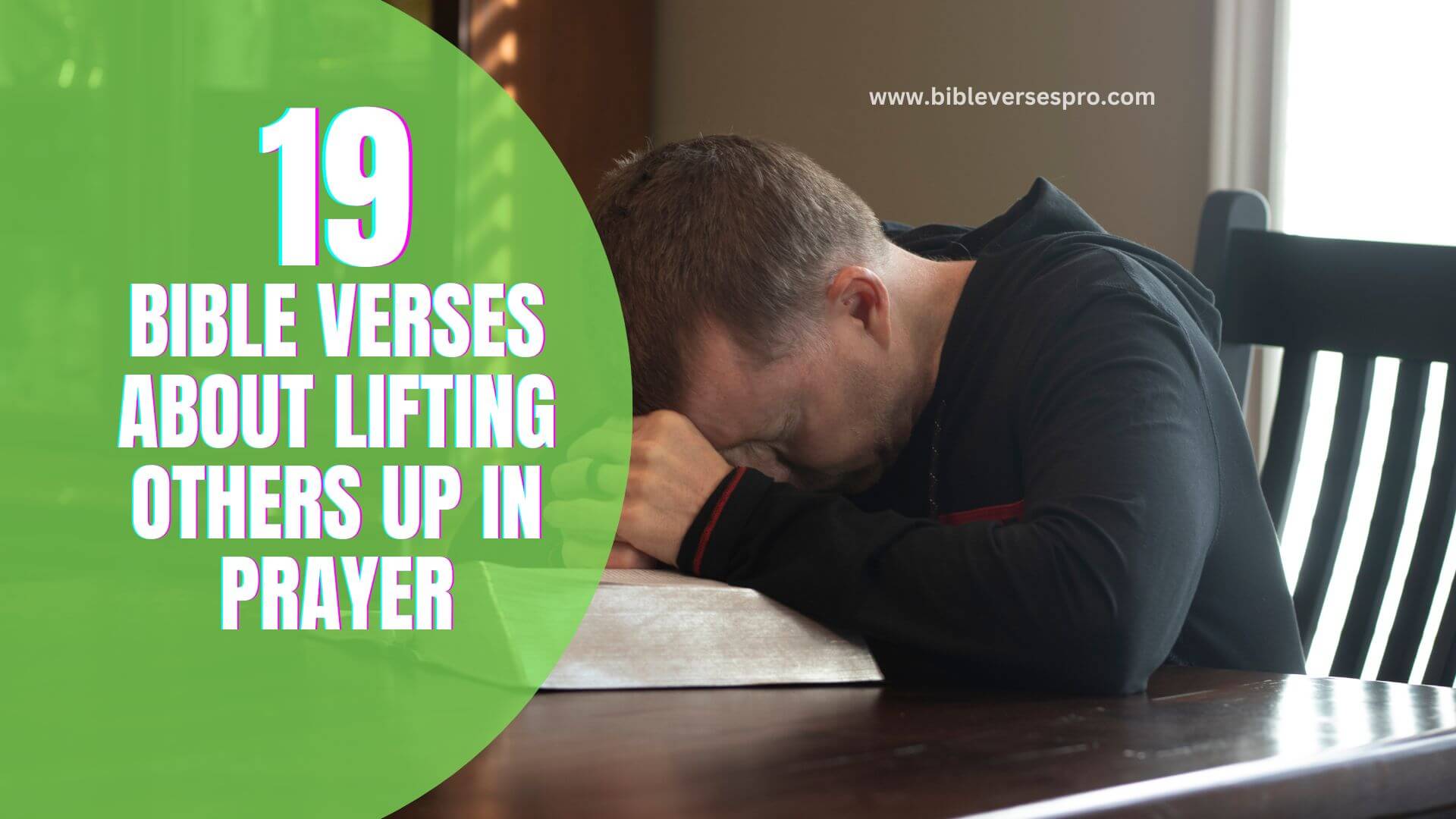Bible Verses about lifting others up in prayer can soothe us when life is complex. Those difficulties can make us instantly lose our enthusiasm or hope.
But taking time to think about what matters most to us and others can quickly and easily improve our mood.
Examples include friends, family, treasured memories, and inspirational Bible verses about lifting others in prayer that can help you get through the day.
Bible verses about lifting others in prayer
What a blessing it is that our God hears us! What a blessing it is that our God desires communication with us! What a gift it is that we can pray to our Lord. Since Christ is our ideal intercessor, we don’t need a human to act as our advocate.
Praying for others is one way we show one another that we care and love them. Let’s examine what the Bible says about lifting others in prayers.
1. 1 Thessalonians 5:11 – Build together
Therefore, encourage and build one another up, just as you are doing.
1 Thessalonians 5:11 ESV

Thessalonian Christians are urged by this verse to lead active, attentive, and focused spiritual lives. This is because of the possibility of Christ’s second coming (1 Thessalonians 5:2), which will physically reunite believers who are alive and those who are deceased (1 Thessalonians 4:13–18).
This text teaches that Christians should be motivated to uplift and edify one another by the thought of spending eternity with Jesus. We must encourage one another that a better day is coming rather than being appalled by how the world turns out.
We eagerly anticipate the time when Jesus returns to rapture in His church. In this space, we should support one another in growing in Christlikeness and equipping ourselves to serve Him.
2. Ephesians 4:29 – Talk positively.
Let no corrupting talk come out of your mouths, but only such as is good for building up, as fits the occasion, that it may give grace to those who hear.
Ephesians 4:29 ESV

In this passage, Paul clarifies that we can regulate our speech: “Let no corrupting language proceed out of your mouths.” The frequent defense of “I couldn’t help saying it” conflicts with this. We are responsible for the words we use, according to the Bible (Matthew 12:36). Christians have control over their comments, which significantly impact how the outside world views them.
Paul offers principles for speaking that should be avoided when employing “corrupting” or derogatory language. In one situation, something that might be pretty fine might be unpleasant or harsh in another.
The objective is to be gracious to people who are hearing our words. We should put the needs of others above our sentiments instead of prioritizing our own.
3. Isaiah 41:10 – Uphold each other.
Fear not, for I am with you; be not dismayed, for I am your God; I will strengthen you, I will help you, I will uphold you with my righteous right hand.
Isaiah 41:10 ESV

God comforts us by reassuring us that He will always be by our side. He encourages us not to be afraid because He will uphold us with His just right hand, giving us the strength to stand our ground.
Keep in mind that they were said to His people by the Universe’s Creator. He is the one who reassures His followers that they need not be alarmed since He can calm the furious storm and mend broken hearts.
He is the one who warns us not to worry and gives us the order not to worry about evil people. He asks us to place all our worries in His capable hands because He loves us and has promised to stick by us through thick and thin, even to the end of the age.
4. Philippians 2:3-5 – Others are significant in your life
Do nothing from rivalry or conceit but in humility count others more significant than yourselves. Let each of you look not only to his interests but also to the interests of others. Have this mind among yourselves, which is yours in Christ Jesus,
Philippians 2:3-5 ESV

Paul urges his readers to abstain from being selfish or insincere. He intended to shift attention from himself to others. Paul here diverts from Christ’s command to “love your neighbor as yourself” in a little but significant way (Matthew 22:36–40).
Instead, he starts by discussing pride and misleading ambition’s motivations. Love and unity are not our simple ideals when these influence our decisions.
Instead, Paul pushed for seeing others as superior to ourselves and treating their needs as more essential than our own. Believers cultivate the kind of humility that leads to oneness and unity by prioritizing the needs of others.
5. Romans 14:19 – Seek peace and mutual understanding
So then let us pursue what makes for peace and mutual upbuilding.
Romans 14:19 ESV

This readiness to renounce our rights and sacrifice our freedom in Christ for the sake of others is a service to Christ in and of itself. Everyone benefits from it, finding calm and encouragement. Paul urges these steadfast Christians to work for that harmony and mutual support by putting their interests aside for the benefit of their family members.
We will prevent disagreements and strengthen our fellow Christians if we can keep regular, share concerns very simply, and heed Paul’s advice. It is crucial to avoid elevating religious life and practice’s supporting issues into main problems. It is not very useful to judge and criticize our family members.
6. John 16:33 – Seek God at all times
I have said these things to you so that you may have peace in me. In the world, you will have tribulation. But take heart; I have overcome the world.”
John 16:33 ESV

God calls us to a good life because Jesus has conquered the world. Christ endured great suffering because God required it of him. Looking for peace elsewhere is a trap. Other means of achieving peace or security merely increase worry.
The peace we discover in Christ lasts forever and is unaffected by anything. Jesus makes a peace vow here. We will experience joy and tranquility in God’s presence if we put our faith in him, follow him diligently, and show gratitude for every little favor.
7. Psalm 16:8 – God is your right hand
I have set the Lord always before me; because he is at my right hand, I shall not be shaken.
Psalm 16:8 ESV

Here, David affirms his faith in the Lord’s ability to safeguard and defend him. In ancient writing, the “right hand” was a person’s greatest strength and might. David had the assurance that God was at his right hand, which gave him a sense of security.
Jesus guarantees to protect everyone who puts their trust in Him. “I grant them eternal life, and they will never expire, and no one will take them from my grasp,” he declares. David understood that even if he passed through the valley of the shadow of death, the Lord, his Shepherd, would watch over him.
8. Romans 12:10 – Have brotherly love.
Love one another with brotherly affection. Outdo one another in showing honor.
Romans 12:10 ESV

Paul is giving individuals who are in Christ a brief list of commands. He explains what it means to live a selfless Christian life. He stated that our affection for one another must be accurate or genuine verses before this one.
He now describes love as a form of loyalty to a sibling. We must have a brotherly love for one another. Faithful brothers and sisters are those who belong to Christ. God accepts us into His family by adopting us as His offspring.
We’re told to challenge one another in displaying respect toward each other. Every member of the body of Christ would constantly feel highly valued by others and would never be content that we are honoring one another sufficiently if each of us took this to heart.
9. John 14:27 – The Peace of God is with you
Peace I leave with you; the peace I give to you. Not as the world gives do I give to you. Let not your hearts be troubled, neither let them be afraid.
John 14:27 ESV

Christ’s peace is not like the peace of this world. Unfairness and death are the finest that nature can offer us. Without God, moral endeavors even result in frustration. Christ’s “peace” in this context relates to hope and certainty beyond anything a corrupt world can provide. It is unchangeable, sure, and unending.
Christ urges His disciples to avoid worry and trouble in this passage. He does not demand that Christians act inhumanely and with stern faces. Instead, it is to accept that suffering is a fact of life while also having faith in God to keep His word.
10. Hebrews 10:24-25 – Stir up one another
And let us consider how to stir up one another to love and good works, not neglecting to meet together, as is the habit of some, but encouraging one another, and all the more as you see the Day drawing near.
Hebrews 10:24-25 ESV

God did not intend for Christianity to be a faith that is practiced alone. The life of an obedient Christian revolves around both encouraging others and receiving encouragement from others.
The Book of Hebrews aims to inspire Christians to maintain their faith. We should “hold fast” to the truth in the face of pressure from persecution and terror. The impact of others is crucial to our spiritual development (Hebrews 3:13).
We should embrace a confident faith and seek to encourage other believers to do the same rather than respond to demanding circumstances with worry or doubt. This includes challenging other Christians to do more to demonstrate their faith via acts of kindness and goodness.
11. Galatians 6:2 – Bear each other’s burden
Bear one another’s burdens, and so fulfill the law of Christ.
Galatians 6:2 ESV
Paul instructs the Galatian Christians on how to coexist peacefully as Spirit-filled followers of Christ. He urged them to intervene when someone is caught in sin in the preceding verse so they can return to walking in the Spirit.
He now encourages them—and by extension, all Christians—to support one another in bearing one another’s hardships. This indicates that even while we are in Christ, we still face challenges in our daily lives. The weight of our temptation to succumb to sin and the difficulty of resisting it are two of those difficulties. Paul wished for us to share that weight rather than fight temptation and sin on our own.
12. 1 Corinthians 13:1-13 – Anyone without love is an empty being
If I speak in the tongues of men and angels, but have not love, I am a noisy gong or a clanging cymbal. And if I have prophetic powers, and understand all mysteries and all knowledge, and if I have all faith, so as to remove mountains, but have not love, I am nothing. If I give away all I have, and if I deliver up my body to be burned, but have not love, I gain nothing. Love is patient and kind; love does not envy or boast; it is not arrogant or rude. It does not insist on its way; it is not irritable or resentful; …
1 Corinthians 13:1-13 ESV
some people thought that those who could prophesy or speak in tongues were more spiritual than others. Along with feelings of inferiority or jealousy, this might have led to another cause for conflict inside the church.
According to Paul, every spiritual gift was bestowed by God for a specific purpose and was necessary for the church, which is the body of Christ. However, he urged them to long for the church to receive the “higher” gifts of apostles, prophets, and teachers. But he promised to show them an even better way to serve one another.
Love is compassionate and tolerant. For the benefit of others, it actively moves and waits. On the other hand, love is incapable of envy or boasting, not even regarding one’s or another’s spiritual gifts. Love does not have a conceit that one is better than others. Love does not behave impolitely, sin, or violate social practices to draw attention to oneself.
13. Proverbs 18:10 – The Lord is a sure refuge
The name of the Lord is a strong tower; the righteous man runs into it and is safe.
Proverbs 18:10 ESV
God offers a fantastic and powerful defense. This is based on the name of the LORD as a declaration of His person, not on a magical uttering of His word as if it were a charm or a spell. The Lord is a solid tower in all that He is and all that He represents.
Who must be concerned that the craftiest arrow can damage us behind these walls? As we practice our faith, we become aware of our protection from external harm. We are shielded from the wrath of God, the curse of the law, sin, condemnation, and the second death.
14. 2 Timothy 1:7 – We have the Spirit of love
For God gave us a spirit not of fear but of power and love and self-control
2 Timothy 1:7 ESV
Timothy is encouraged in this verse to show love and self-control, as Paul points out. Timothy is being pointed out that he comes from a devoted family. Timothy is also comforted by Paul’s statement that they both serve the same God, who has given them a spirit of “strength and love and self-control.”
Love” was an essential theme for Paul and a recurring element in Jesus’ teachings. This concept of self-control also appeared in (2 Timothy 2:9, 15). Paul regularly emphasized to the believers in his charge that self-control is a fruit of the Spirit and should be displayed.
15. Colossians 3:12 – Display Godly attributes towards one another
Put on then, as God’s chosen ones, holy and beloved, compassionate hearts, kindness, humility, meekness, and patience,
Colossians 3:12 ESV
Paul lists five lifestyles that Christians should adopt in this verse. Additionally, Jesus introduces this list by addressing believers by three different names. They are “God’s chosen ones,” the first of God elected or chosen by God to be a part of His family. These believers hold a term for “set apart” second. Not their good deeds, but God’s work in them, is responsible for this. Thirdly, God “loves” believers (John 3:16).
Believers are to live in harmony. It is a quality that God values throughout the Bible (James 4:6). The gospel demands that people acknowledge their sinfulness and need for a Savior. We should acknowledge God’s sovereignty in our lives and how small we are compared to Christians. Additionally, humility helps us avoid being cruel or unkind to other individuals.
16. Romans 15:2 – Please, your neighbor
Let each of us please his neighbor for his good, to build him up.
Romans 15:2 ESV
The following passage from the Old Testament backs up his statement. He claims that God’s original intent was for Jews and Gentiles to accept Christ as their Savior.
Paul’s reference to a passage from the prophet Isaiah found in Isaiah 11:10–12. The descendant of Jesse, who will rule over Israel and all the world nations, is referred to as “the root of Jesse.” This prophecy relates to the arrival of the anticipated Messiah of Israel. However, the Gentiles won’t just become the Messiah’s vessels. They will put their hope in Him.
Paul ties the verse to the idea that Christ has taken on the title of Lord of All and that Gentiles who come to God by trust in Christ have put their hope in Him for salvation. The central claim of Paul is that Jesus fulfills all of these Old Testament scriptures for both Israel and the Gentile nations.
17. Jeremiah 29:11 – God’s plan for you is the best
For I know the plans I have for you, declares the Lord, plans for welfare and not for evil, to give you a future and a hope.
Jeremiah 29:11 ESV
God promised the exiled Jews in Babylon hope in this verse. Does that imply that we modern Christians are exempted from its application? God’s purpose for us as Christians is to enter the new heaven and earth he has promised (Rev. 21–22).
Jesus tells us to seek God in prayer, and we will find him, and to ask God in prayer, and it will be granted to us (Matt, 7:7). Even the suffering he permits for us, according to God’s promise in Romans 8:28, will be for our ultimate good. God continues to communicate with us through his promise to the Jewish people during their exile.
We may confidently apply the essence of this promise to our lives today after we comprehend the nature of God’s purposes for us as believers and the nature of the good he promises to do us.
18. Isaiah 40:31 – There is sufficient strength for everyone
But they who wait for the Lord shall renew their strength; they shall mount up with wings like eagles; they shall run and not be weary; they shall walk and not faint.
Isaiah 40:31 ESV
This bible passage includes a powerful promise of power for the weary: “those who wait for the Lord shall replenish their strength; they shall mount up with wings like eagles; they shall run and not faint.” This promise should be comparable to flying like an eagle or running without getting tired.
When this promise was initially given to the Israelites, they were exhausted from their suffering. They had spent several years in exile in Babylon. They believed that God was either unable to assist or unconcerned. They heard Isaiah say, “Have you not known? Do you not know? The Lord is the eternal God who made the earth and everything in it.
He doesn’t get tired or dizzy. You may grow weak, but God doesn’t, and that’s a friendly reminder for the weary. God is a limitless source of strength, and he liberally distributes it: “He increases strength in him who has no might, and provides power to the faint” (Isa. 40:29). He is the way he is. The Ever-Strong and Never-Weary One delight in aiding the feeble and weary.
19. Hebrews 3:13 – Show love to one another to reduce hardheartedness
But exhort one another every day, as long as it is called “today,” that none of you may be hardened by the deceitfulness of sin.
Hebrews 3:13 ESV
This verse serves as a reminder to Christians not to let sin, stubbornness, or a lack of faith prevent them from receiving God’s benefits that have been promised. When Israel did not “hold fast,” it suffered and was forced to spend forty years in the desert.
When Christians lack confidence and faith in God, they may also experience suffering. The influence of other Christian believers is one way to steer clear of these traps. Gentle correction is one of the many advantages of solid Christian relationships.
Conclusion
Experiencing God’s peace is one of the advantages of prayer offered to us that pray for our upliftment. God will move in our hearts while we pray for upliftment for other people with these Bible verses.
God makes us adapt to His will and gives us His serenity of upliftment. We pray for the Holy Spirit to speak for them. Because we care about them and want them to have a deeper relationship with God, we pray for them.







